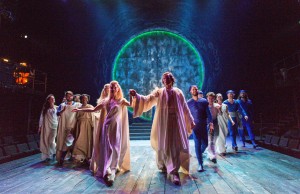[Apologies for the delay on posting this — it’s been a busy spring!]
A few days before I saw Tfana’s new production of Pericles, I read through a couple dozen early-in-the-term student papers on the play. Many of my students uncovered in this strange play a semi-feminist ethos, in which feminine power resists or restructures masculine violence. Most of these papers were about Marina and the play’s final two acts, but one of the most original explored Thaisa after her shipwreck. The left-for-dead heroine upon being returned to life points herself toward the Temple of Ephesus instead of her lost husband. Her turn to Diana, my student’s essay implied, pivots the play: human desires no longer take center stage. What if the important things are elsewhere?
I was thinking about that nonhuman turn when watching the latest Pericles to come to Brooklyn.
I found a lot to enjoy, especially visually and musically, in Trevor Nunn’s production. The scenery, which you can get an extended taste of in this batch of photos Tfana released on Facebook, and the music, performed by PigPen Theatre Co, were just fantastic. The costumes and sets were wonderfully intricate.
Like Christopher Isherwood in the Times, I appreciated the energy and verve of the production. We didn’t love the same performers; he thought Christian Camargo in the title role played with “marvelous clarity” and “real feeling,” while I thought he was just a bit stiff. We agree that Lily Engleert was too “petulant and prissy” to be a great Marina, but our biggest disagreement is about Gia Crovatin’s Thaisa, who Isherwood thought showed insufficient pathos but I thought was one of the revelations of the night.
Thaisa’s an interesting role, and she often ends up playing second fiddle to her daughter Marina, who redeems the play after a fourteen-year gap. Crovatin’s performance, to my mind, brought forward the strength and confidence that Engleert’s Marina lacked. Nunn’s direction added to the part, with Thaisa and Pericles sharing an extra-textual song — which the production cleverly repeated: it was a wooing song (Pericles to Thaisa), a lullaby (Pericles to baby Marina), and a song of reconciliation (Marina to silent Pericles near the play’s end). (The New Yorker review has some more information about the play’s music, composed by Shaun Davey.)
Beyond Thaisa, the other standout for me was Gower, played with musical gusto by Rafael Nash Thompson. Much of the play’s creaky plot-machinery relies on the fourteenth-century ghost-poet’s four-beat exposition, and letting those words, judiciously compressed and at times reworked, blossom into song proved an inspired choice. Gower’s smile and deep voice cast a harmonious net over the production, perhaps muting the play’s tragic depths but adding a coherence that’s not always easy to find, especially not in this production’s lead roles. I’ve seen better productions of this play, but not better performances of these two roles.
Get down to Fort Greene soon — it’s been extended through April 10!

Leave a Reply